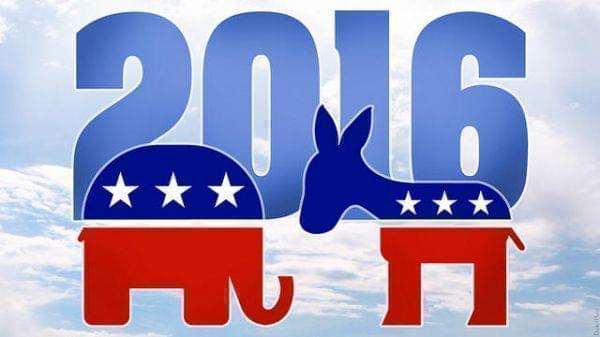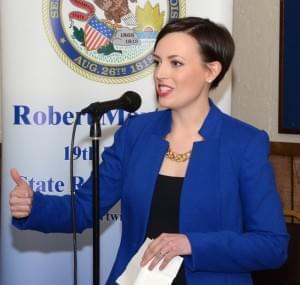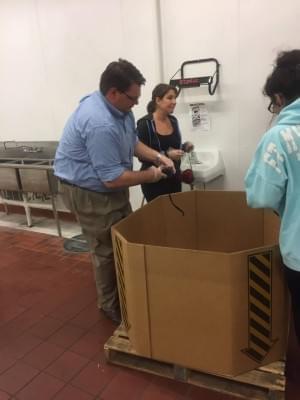Illinois Issues: Legislative Races To Watch

There are several state legislative races to watch in 2016 Donkeyhotey/Flickr
The presidential race is capturing most voters' attention. But here in Illinois, there's record-breaking spending going into races for the General Assembly. Hanging in the balance is the state of Illinois, or at least its budget, anyway.
It’s not unheard of for both candidates in an Illinois state legislative race to spend a total of $1 million or more. But Kent Redfield, who has tracked campaign spending in Illinois for years, says this election year is truly unique. “It’s just light-years different,” says Redfield, professor emeritus of political science with the University of Illinois Springfield.
In the past, the spending record in the House for a single race was about $3.2 million and for the Senate was just over $4 million. This kind of spending wasn’t common, and any race with spending that cracked seven figures turned some heads. But Redfield says that this time, there are at least four Senate races on track to break that record. As many as a dozen House races could break the spending record in that chamber, too. He describes these estimates as quick and dirty projections based off of his own tracking of campaign contributions and spending, and that of Scott Kennedy at Illinois Election Data. (To any reader interested in looking into campaign spending in the state, Kennedy’s website is a can’t-miss source.)
What’s the cause of all this spending? Gov. Bruce Rauner and a few other wealthy Republicans are dumping millions of their own dollars into the mix, and “Democrats have responded by tapping big labor,” Redfield says. Big labor has paid up after Rauner posed them several existential threats in the form of bullet points on his so-called Turnaround Agenda.
So now the money is flying. Democrats have supermajorities in both chambers at stake. But it’s unclear if Republicans will be able to make substantial inroads during a presidential year, which typically favors Democrats in the state, with Donald Trump at the top of the ticket.
“It’s like the Battle of Verdun in the First World War where both sides are lobbing uncounted volleys of ordnance at one another,” says Chris Mooney, executive director of the U of I’s Institute of Government and Public Affairs. “In the end, the question is: are they going to be able to move the needle more than slightly?”
Hanging in the balance of this fight is the state of Illinois, or at least its budget, anyway. In June, lawmakers and Rauner agreed to a partial budget to carry them past the election. That spending authority runs out in December.
How would those running propose to tackle the state’s budget crisis? There are Democratic and Republican candidates who say they oppose any new taxes. Instead, they’re for closing the deficit — which was recently pegged at somewhere between $14 billion and $17 billion — with cuts alone. But they don’t detail what cuts they would make.
This is a feat Rauner hasn’t been able to pull off in either of his proposed budgets without the use of some savings through smoke-and-mirror trickery. And that’s not a surprise. Even groups traditionally viewed as business friendly have advocated for a mix of cuts and revenues.
The governor hasn’t taken such a strident anti-tax posture. He has said that he would prefer not to raise taxes, but he would consider it if the legislature sends some of the items on his agenda to his desk for a signature. He says he’s flexible on which ones, telling lawmakers just to pick some and get to it. But Democrats say he’s holding the budget hostage with anti-union demands and proposals that would hurt the middle class.
Several candidates have followed Rauner’s lead, saying they would support new revenue after cuts and reform. None of the candidates featured in this story are running loudly and proudly in support of any tax increase proposal that could help in the immediate future.
Many Democrats say they support the so-called millionaire tax— first proposed my House Speaker Michael Madigan — which would add a tax surcharge to personal income greater than $1 million. But that change would require an amendment to the state’s Constitution, something that couldn’t happen until the next general election. The proposal that was already considered by lawmakers and failed to make it to this year’s ballot would bring in a paltry amount of revenue compared to the deficit.
It’s no surprise candidates are trying to remain vague on the budget. There are only difficult choices ahead on that front. But that’s for another day. Meantime, here are some of the races to watch as November 8th closes in:
Illinois House
20th House District
This race has the distinction of being dubbed the most expensive statehouse race in the nation by the Associated Press earlier this month. Rep. Michael McAuliffe is the only Republican state legislator from Chicago. Democrats are hoping challenger Merry Marwig can change that.

Rep. Michael McAuliffe is the only Republican state legislator from Chicago.
Marwig previously worked with the Fair Allocation in Runway (FAiR) Coalition to advocate for changing the flight patterns of planes flying into and out of Chicago’s airports so that the noise from flights would be more evenly distributed over neighborhoods. She was also chief of staff at a software firm based in Chicago.

Mary Marwig advocated for changing flight patterns for Chicago’s airports to reduce noise.
McAuliffe has served in the House since 1996, and he has been 41st Ward committeeman since 1995. McAuliffe’s take on taxes sounds very similar to Rauner’s. He says he would only consider new revenue if it was tied to reforms. He opposes increases in property taxes and taxing retirement income. He has supported other components of the governor’s agenda, but uses more tempered rhetoric than Rauner when talking about public employee unions.
Marwig says she would not support any income tax increase on the middle class. That would take a traditional income tax increase off the table because Illinois’ flat rate is equally applied across all brackets. She says she would support a millionaire tax amendment. She also supports ending some corporate tax breaks.
62nd House District
The race in this district is a rematch between Rep. Sam Yingling, a Democrat from Grayslake, and Republican Assistant State’s Attorney Rod Drobinski from Wauconda. Yingling narrowly defeated Drobinski in 2014.
Before coming to the General Assembly, Yingling served as Avon Township Supervisor. Yingling voiced opposition to the 2011 tax increase. He opposes taxing retirement income and has also called for a freeze on property taxes. He did vote in favor of eliminating some corporate tax breaks, and his opponent has made that vote an issue of the campaign. Drobinski also supports a property tax freeze and opposes any tax increases.
76th House District
Rep. Andy Skoog, a Democrat from LaSalle, was appointed to his seat last year after former House member Frank Mautino was confirmed as Illinois’ auditor general. Skoog faces Republican candidate Jerry Long. Before coming to the House, Skoog served as LaSalle County circuit clerk and a trustee in the village of North Utica. He does not support raising the income tax, instead he emphasizes cuts to balance the budget. He says he would consider eliminating some corporate tax breaks. He also supports a millionaire tax amendment.
Long is a long-haul trucker and owns a real estate business. He says he opposes tax increases. He supports much of Rauner’s agenda, including term limits for lawmakers and changing the way the state’s legislative districts are drawn. Long challenged Mautino for the seat in 2014 and lost in a close race. Mautino is currently under investigation over allegation that he misspent campaign funds.
79th House District
Dueling allegations of voter fraud and voter intimidation have surfaced in this race between Democrat Rep. Kate Cloonen and Republican lawyer Lindsay Parkhurst. Both candidates are from Kankakee.
Cloonen has served in the House since 2013. Before she ran for office, she was a music teacher and owner of a construction company. Both Cloonen and Parkhurst say they oppose any tax increases.
The district is getting particularly close consideration from Democrats and Republicans because Cloonen won the seat by only 112 votes in 2014.
Kankakee County State’s Attorney Jamie Boyd, who is a Republican, announced via press release that his office was looking into allegations that some voters were being paid for casting their ballots in favor of Democratic candidates. The statement, released earlier this month, also said that some requests to vote by mail appeared to be fraudulent. “These documents were … filed by people who are not voters in Kankakee County,” the press release said.
Meanwhile, local officials have been accused of intimidating minority voters at the polls. Democratic Attorney General Lisa Madigan and U.S. Attorney James A. Lewis met with Boyd and local election officials. According to a press release from Madigan, the group discussed “complaints, including allegations of some minority voters being subject to unnecessary requirements and misinformation about their ability to cast their vote, law enforcement officials intimidating voters and questioning people who drove them to vote, and offers in exchange for casting ballots.”
Officials from the Illinois State Board of Election were also in on the meeting, which Madigan said was held to “ensure a fair, open and legal election this fall that allows all residents to vote equally without obstacles or intimidation by law enforcement officials or offers in exchange for votes, all of which are prohibited by law.”
95th House District
When Republican law student Avery Bourne was sworn in at 22, she became the youngest member of the General Assembly. She was appointed last year to replace former Rep. Wayne Rosenthal, who was tapped by Rauner to run the Illinois Department of Natural Resources.
According to the Chicago Tribune, Bourne was a campaign volunteer for Rauner and other Republicans. Her appointment ruffled some feathers among local Republican officials who were also eyeing the seat, and she faced two challengers in the primary. Christopher Hicks, who failed to beat out Bourne in the primary, said this of her, “I saw a young and immature girl put in office who doesn't deserve to be there.” Hicks was 29 at the time he made that statement.
Now Bourne is defending her seat against a challenge from Democrat Mike Mathis of Gillespie. Mathis previously served on Gillespie’s city council and as its mayor. He was also Macoupin County circuit clerk. He resigned from his position as president of Illinois Democratic County Chairmen’s Association after he decided to run for the General Assembly. Mathis supports freezing property taxes. He also criticized Bourne for voting against the so-called millionaire tax constitutional amendment, which would have added a 3 percent tax surcharge to personal income over $1 million. Bourne backs much of Rauner’s agenda, including imposing term limits on lawmakers and freezing property taxes.
Bourne did not support legislation that would have sent state workers’ contract negotiations with the Rauner administration to arbitration. The governor has said those talks are at an impasse while the American Federation of State, County and Municipal Employee accuses the administration of refusing to bargain in good faith. This perceived anti-union stance could be a liability in the race because the district is home to many state workers. The one Springfield-area Republican who supported the legislation was also the only Republican to do so. Sen. Sam McCann, from Plainview, faced a well-funded primary opponent after crossing Rauner with that vote. McCann ultimately won out with union backing.
99th House District
Rep. Sara Wojcicki Jimenez was also appointed to her seat in the Illinois House last year. She was chosen after Raymond Poe left the job to become director of the Illinois Department of Agriculture. She is a former television journalist who has had a string of government jobs — most recently as chief of staff for first lady Dianna Rauner. Her appointment to that position caused controversy because the job paid $100,000.

Republican Rep. Sara Wojcicki Jimenez is running to retain the seat she was appointed to last year.
She squares off against Democratic Sangamon County Board Member Tony DelGiorno in her first attempt to retain her House seat. Both candidates say the state’s budget is their top priority. DelGiorno says he supports amending the state’s Constitution to allow for a graduated income tax. Much like the governor, Jimenez says she is open to some form of tax increase but only after cuts and “reforms” are made.

Democrat Tony DelGiorno, seen here volunteering at a food bank, is a Sangamon County Board member.
DelGiorno argues that voters can voice their distaste with Rauner’s agenda by casting their vote for him. He paints Jimenez as beholden to Rauner because the governor reportedly backed her appointment to the House.
She counters this claim by pointing to a handful of votes she has taken that went against the governor’s stances — including joining several other Republican lawmakers in supporting an automatic voter registration bill that the governor later vetoed. However, she also didn’t support that legislation which would have sent public employee contract talks to arbitration. Union voters may view that stance as siding with Rauner in what many see as a war over the very existence of public employee unions in the state.
117th House District
Republican Dave Severin, a businessman from Benton, is challenging Democratic Rep. John Bradley, a Marion Democrat, in this southern Illinois district. Bradley has served in the House since he was appointed to a seat in 2003. He chairs the House Revenue and Finance committee, which has made the annual revenue projections that House budget proposals were often based on. Bradley voted in favor of the 2011 temporary income tax increase. He was also at the center of negotiations when lawmakers overhauled the state’s worker’s compensation system in 2011. In recent years, he has become a trusted Madigan ally. He currently serves as the assistant majority leader in the House.
This closeness to Madigan has been fodder for negative advertising against Bradley. He has responded by saying the two have a good working relationship, but that he disagrees with the speaker at times and would not betray his southern Illinois roots by voting against his district’s interests. Bradley has openly butted heads with members of Gov. Bruce Rauner’s administration.
Meanwhile, Bradley has been working to tie his opponent to Rauner. Severin says he supports the governor’s agenda, which includes term limits on lawmakers, pro-business changes to the state’s workers’ compensation system and several anti-union proposals. But Severin says he’s his own man, and his focus is on trying to stimulate the area’s struggling economy. He doesn’t support any form of tax increase. His campaign website says, “Higher taxes only accelerate Illinois’ downward spiral.”
Severin has served on the Benton school board for two decades and is currently board president. Severin owns All Stars-n-Stitches, a custom embroidery, printing and trophy shop in Benton. Of the tough legislative races in the state, this one has gotten especially nasty — with both candidates facing negative advertisements accusing them of being sympathetic to sexual predators.
Illinois Senate
The Senate is not the battleground that the House is this year. There are fewer seats on the line, and no major upheaval at stake. Even if Republicans win every seat they are vying for — an unlikely prospect — they wouldn’t be able to gain control of the chamber. Still, there are races drawing interest. Here are a few:
23rd Senate District
Sen. Tom Cullerton, a Democrat from Villa Park, is facing a challenge from Republican Seth Lewis, an insurance agent and small-business owner from Bartlett.
Cullerton has served in the Senate since 2013. Before that, he was Villa Park village president. He opposes increasing the income tax and is in favor of freezing local property taxes. He supports term limits for legislative leaders.
Lewis is among the Republican legislative candidates echoing Rauner’s call for pro-business initiatives before he would consider a tax increase. He says he wouldn’t support taxing retirement income or making changes at the state level that would result in increases to local property taxes. He supports term limits for lawmakers and making business-friendly changes to the state’s unemployment system.
58th Senate District
Democrat Sheila Simon and Republican Paul Schimpf are facing off for the seat left vacant by retiring Republican Sen. David Luechtefeld.
Simon is a professor at Southern Illinois University’s School of Law. She served as lieutenant governor under Gov. Pat Quinn, but she opted not be Quinn’s running mate in 2014. Instead, she made a failed bid for comptroller against Judy Baar Topinka.
Schimpf is a lawyer and a retired Marine. He made a failed attempt to to unseat Attorney General Lisa Madigan in 2014. Though he didn’t come close to beating the popular Madigan, he was able to raise his profile above other Republican challengers to go up against her in the recent past.
Schimpf has Luechtefeld’s endorsement. Simon, the daughter of late U.S. Sen. Paul Simon, has a recognizable and credible family name.
Schimpf says he doesn’t support all of Rauner’s agenda, but he says he backs pro-business changes to the state’s workers’ compensation system and term limits for lawmakers. Both candidates agree that the budget deficit cannot be solved through cuts alone. Simon says she would support the millionaire tax amendment. Schimpf says any tax increase would be contingent on getting business-friendly reforms through the legislature.
59th Senate District
Republican Dale Fowler, who is mayor of Harrisburg, is challenging Sen. Gary Forby, a Benton Democrat.
Forby has served in the Senate since 2003. Before that, he served one term in the House. Forby voted against the 2011 tax increase. However, he did vote in favor of a 2009 tax increase that passed in the Senate but did not make it into law. He told the Southern Illinoisan at the time, “I cannot go home and throw my nursing homes out in the street, shut my hospitals down and not pay our bills. It's definitely going to hurt me, but you know what sometimes you have to do the right thing. You just can't lay back and hide all your life.”
Forby has said that everything should be on the table to address the current budget crisis. But he says he views increasing taxes as a last resort and would only support a bipartisan plan to do it.
Fowler worked under former Secretary of State Jim Edgar and spent more than two decades employed by the Illinois Department of Corrections.
Many Republicans advocate for zero-based budgeting. The concept would have all areas of state spending start with nothing and build up. The idea is that all spending must be justified and not automatically carried over each year. Fowler calls for moving in the opposite direction for certain core state services, like education and programs that serve seniors, the disabled and veterans. According to his website, he’s calling for “dedicated funding streams” that would be “re-appropriated every year” for these areas of spending.
Fowler has said he could consider supporting some form of tax increase if cuts and business-friendly reforms were made. He also supports term limits.
Post-election compromise?
It’s quite possible neither party will be able to gain enough ground to claim a referendum for their side after Election Day. Will they be able to put politics aside after a hard-fought campaign and reach a compromise, as the governor has said he hoped would happen when he signed the stopgap?
“Even at the time, I think to most observers that sounded like a ludicrous idea because we knew that there was going to be this kind of money coming in. There was already stockpiles of money,” Mooney says.
He says wounds from the millions of dollars worth of negative advertisements and mailers will still be fresh.
“It may shock your readers (to hear it, but) elected officials are human beings. Who wants to be told on TV over and over again how bad you are in these really horrible negative commercials that your kids have to see, that your neighbors have to see? It’s going to have an effect.”
He points out that if anything, all this big spending will likely just make clear for lawmakers on both sides of the aisle where there political bread is buttered — as if they didn’t know already. This cycle will drive home how much they need the financial backing of their party leaders to survive their next election, and could make them wary to step out of line for fear of facing a primary challenge.
Mooney says the best-case scenario might be more short-term spending plans that allow the state to stagger forward “with an eye toward November of 2018.” That’s when Rauner will be up for re-election, if he chooses to run again as he says he plans to. Mooney says, “So it can be a literal referendum on the governor’s policy rather than the figurative one that we’re seeing this year.”
Illinois Issues is in-depth reporting and analysis that takes you beyond the headlines to provide a deeper understanding of our state. Illinois Issues is produced by NPR Illinois in Springfield.
Links
- Illinois Issues:Slave State
- Illinois Issues: Transportation Lockbox Could Come With Unintended Consequences
- Illinois Issues: The Costs Of Doing Business Without A Budget
- Illinois Issues: Sixteen And (Not) Pregnant
- Illinois Issues: Mike Madigan And The ‘Party Of Economic Opportunity’
- Illinois Issues: What’s Up With The Judicial ‘Smackdown’ Of Remap Referendums?
- Illinois Issues: Rewriting The Rule Book
- Illinois Issues: Historic Dilemma
- Illinois Issues: Still Paying For Justice
- Illinois Issues: The Impasse And The Damage Done
- Illinois Issues: Saving Lives In The Fight Against Heroin

